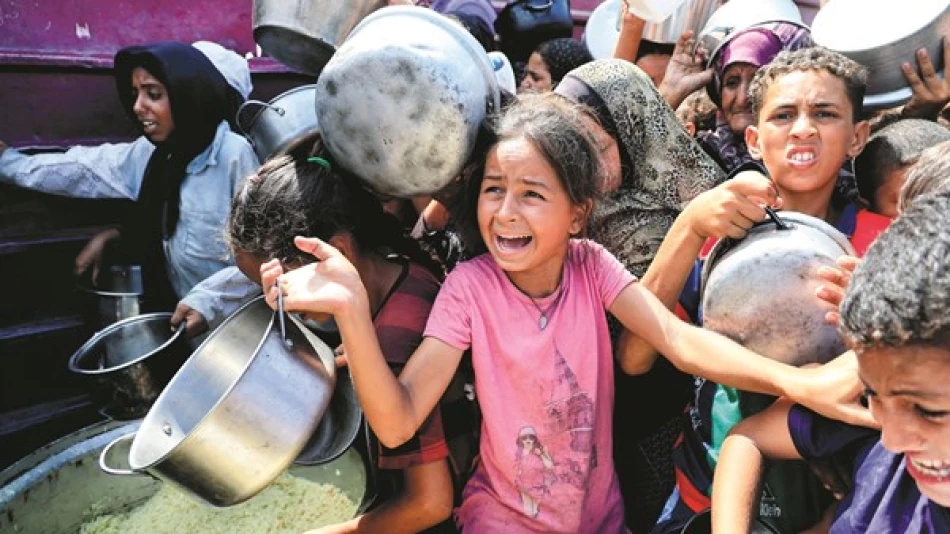
UNRWA Warns of Intentional Famine Crisis Unfolding in Gaza
Gaza's Children Face Mass Starvation as Military Operations Intensify
International humanitarian agencies are sounding alarm bells over an impending catastrophe in Gaza, where malnutrition among children has surged sixfold since March. With Israeli military operations escalating and aid access severely restricted, UN officials warn that weakened populations may not survive another wave of displacement, describing the crisis as a deliberate weaponization of food supplies.
Malnutrition Crisis Reaches Breaking Point
Philippe Lazzarini, Commissioner-General of UNRWA, delivered stark warnings during a press briefing in Geneva, highlighting data showing a dramatic spike in child malnutrition across Gaza. The agency's findings reveal that current malnutrition rates are six times higher than levels recorded in March, creating conditions where children lack the physical strength to endure further displacement.
"We have extremely vulnerable populations who will be subjected to a major new military operation," Lazzarini stated. "Many of them simply will not have the strength needed to undertake new displacement. Many children will not survive."
The UNRWA chief characterized the situation as an "artificial and manufactured famine" that represents the deliberate use of food as a weapon of war—a classification that carries significant legal implications under international humanitarian law.
International Red Cross Warns of 'Unbearable' Escalation
The International Committee of the Red Cross echoed these concerns, with spokesperson Christian Cardon describing the intensification of fighting as "unbearable" for Gaza's trapped population. The organization emphasized that Gaza's enclosed nature leaves civilians with no escape routes while access to healthcare, food, and clean water becomes increasingly limited.
"Intensified fighting in Gaza means more deaths, more displacement, destruction, and more panic," Cardon explained, underscoring the compounding effects of military operations on an already devastated humanitarian landscape.
UN Human Rights Office Documents Systematic Crisis
Thameen Al-Kheetan, spokesperson for the UN High Commissioner for Human Rights, provided additional context on the crisis's scope, confirming that hundreds of thousands of Palestinian families now teeter on the brink of famine. His assessment points to systematic destruction of Gaza's food production capabilities and local economy over the past 20 months.
Deadly Dilemma for Desperate Civilians
Al-Kheetan described the impossible choice facing Gaza's population: "The desperate hungry in Gaza face two tragic options—either die of starvation or be killed while trying to obtain food." Reports indicate that Israeli forces have opened fire on civilians attempting to reach aid distribution points operated by humanitarian organizations, resulting in dozens of casualties.
This militarization of humanitarian aid delivery violates established international standards for aid distribution and significantly increases risks for civilian populations already facing catastrophic conditions.
Legal Implications and War Crimes Allegations
The UN human rights office has characterized the systematic use of food as a weapon and the obstruction of access to vital services as constituting war crimes under international law. In some cases, these actions may qualify as elements of additional crimes under international legal frameworks.
The deliberate targeting of food production systems, combined with restrictions on humanitarian access, creates conditions that international legal experts increasingly view through the lens of collective punishment—a practice prohibited under the Geneva Conventions.
Historical Context and Unprecedented Scale
While Gaza has experienced multiple humanitarian crises over the past two decades, current conditions represent an unprecedented deterioration. The systematic destruction of local food production, combined with severe restrictions on aid access, has created what humanitarian agencies describe as an entirely artificial famine.
The current crisis differs from previous escalations in both scale and duration, with the 20-month timeframe allowing for comprehensive degradation of Gaza's civilian infrastructure and economic base. This extended timeline has eliminated many of the coping mechanisms that allowed populations to survive during shorter periods of conflict.
As military operations continue to intensify, the international community faces mounting pressure to address what humanitarian agencies characterize as a preventable catastrophe that threatens to claim the lives of Gaza's most vulnerable populations, particularly children already weakened by months of inadequate nutrition and repeated displacement.
Most Viewed News

 Layla Al Mansoori
Layla Al Mansoori






